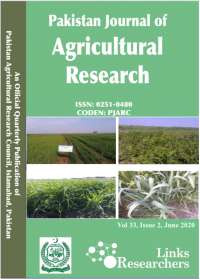Influence of Location on Quality Attributes and Storage Performance of Sweet Orange (Blood Red)
Influence of Location on Quality Attributes and Storage Performance of Sweet Orange (Blood Red)
Aurang Zeb1, Abdur Rab1, Shujaat Ali1,2*, Ijaz Hussain2, Shah Masaud Khan2, Israr Ahmad1, Bilal Pervaiz Khan1, Shakila Umer3 and Muhammad Abbas1
ABSTRACT
The lab experiment was conducted to evaluate the influence of location on quality attributes and storage performance of Sweet orange (Blood red). The Sweet oranges were collected from four different locations i.e. location-1 (Torwarsak, Buner), location-2 (Rabat, Lower Dir), location-3 (Wartair, Malakand) and location-4 (Palai, Malakand), which were stored in three replications at room condition for 48 days and Complete Randomized Design was used during the post-harvest experiment. Data were recorded on fruit juice pH %, titratable acidity, percent juice content, Rind thickness, Rind weight loss, at 12 days intervals. The fruit juice pH showed an increasing trend from the start to the end of storage. While the juice content decreased with storage intervals. The maximum titratable acidity (1.97) was documented from Palai (Malakand) in freshly harvested fruits after 48 days of storage. The minimum rind thickness (0.66 mm) and the highest rind weight loss percentage (41.42%) was recorded after 48 days of storage. It is concluded that Sweet orange fruits from different locations can be best stored at room temperature (20±1 0C with a relative humidity of 45-50 %).
To share on other social networks, click on any share button. What are these?






